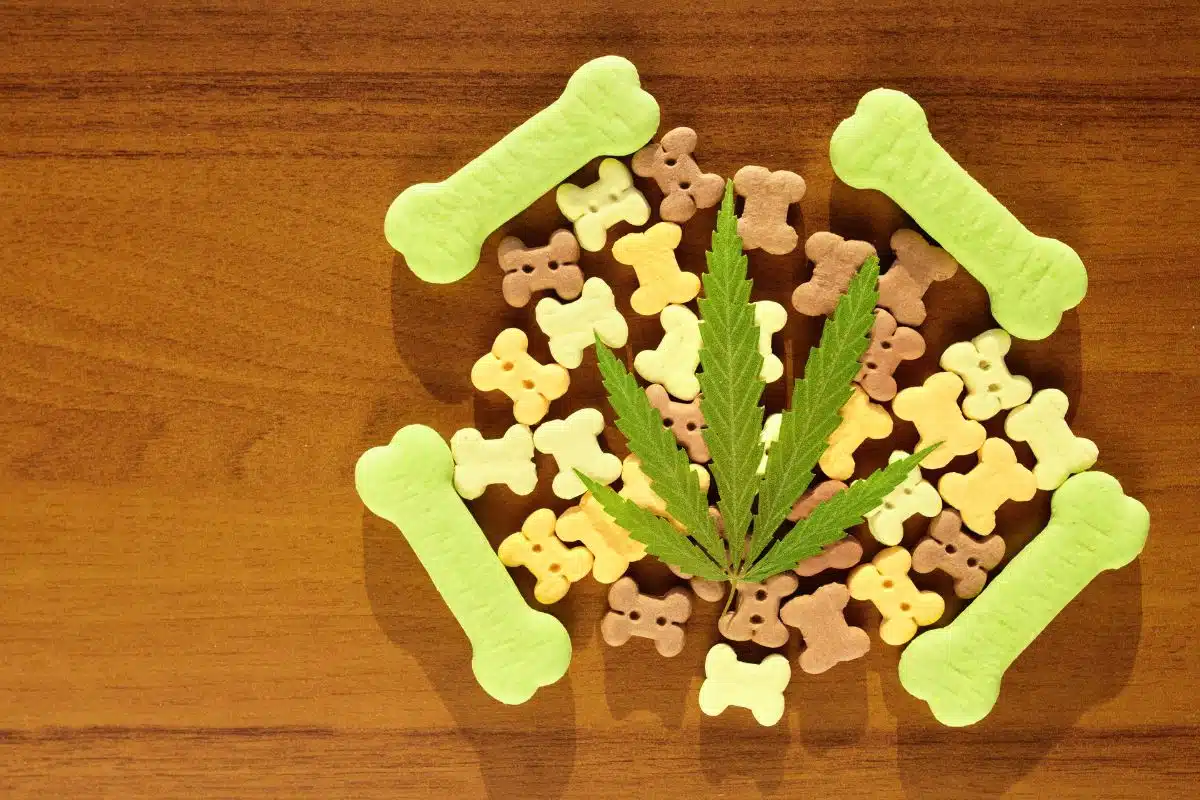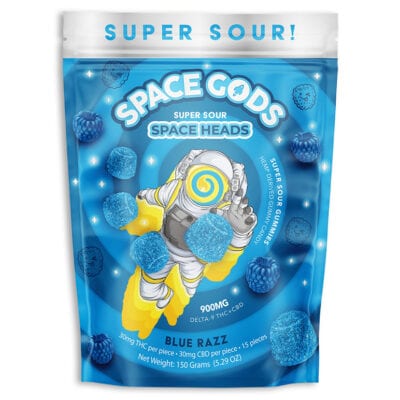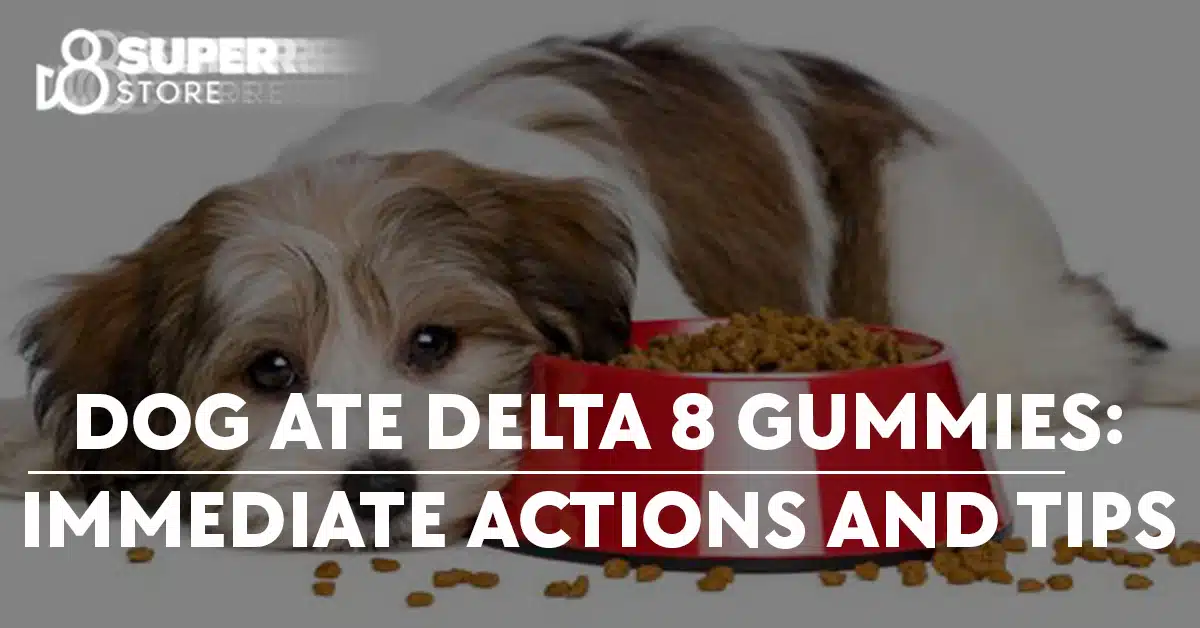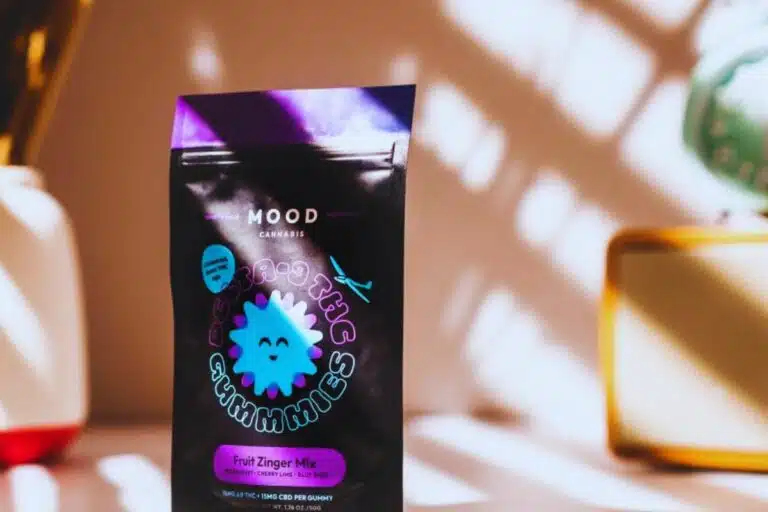Dog Ate Delta 8 Gummies: Immediate Actions and Tips
Delta-8 THC gummies are catching on as they hit softer than the usual Delta-9 THC types. It’s super important to treat these gummies like any THC goodie to prevent curious dogs from snagging them. Even tiny amounts of THC can take our furry pals on a wild ride, leading to big problems. Stick around, and you’ll learn why safety is key.
When a dog consumes Delta-8 THC gummies, they may experience various symptoms, including lethargy, impaired coordination, and even more severe reactions, depending on the amount consumed. It is crucial for pet owners to recognize and respond to these signs to help their pet recover from the situation as quickly and safely as possible.
In the following sections, we will discuss how to identify the symptoms of Delta-8 THC ingestion in dogs, what steps pet owners should take if they suspect their dog has consumed gummies, and how to prevent such incidents from happening in the future.

Understand Delta 8 THC in Gummies
Delta 8 THC, also known as delta-8-tetrahydrocannabinol, is a minor cannabinoid found in the cannabis plant. It is a close relative of the more well-known delta-9-tetrahydrocannabinol (delta-9 THC), which is the primary psychoactive compound in cannabis. However, delta 8 THC differs from delta-9 THC in terms of its potency, offering a milder, more manageable experience.
Delta 8 THC gummies are popular edible products in the cannabis market, thanks to their ease of consumption and more predictable dosing. These gummies are infused with delta 8 THC extracted from the plant, providing a convenient way to experience the compound’s benefits without inhaling smoke or vapor. They typically come in various flavors and dosages, allowing consumers to choose based on their preferences and needs.
One of the key characteristics of delta 8 THC is its moderate psychoactive effects when compared to delta-9 THC. While both cannabinoids interact with the body’s endocannabinoid system, delta 8 THC is known to produce a more clear-headed and focused high. Users often report a sense of relaxation and uplifted mood, without the anxiety and paranoia that can sometimes accompany delta-9 THC.
Another notable feature of delta 8 THC is its potential therapeutic benefits. Similar to CBD, delta 8 THC has shown potential in reducing inflammation, pain, and nausea. Additionally, it may help with sleep regulation and appetite stimulation. However, it is essential to note that research on delta 8 THC’s effects and benefits is still in its early stages, and more studies are needed to fully understand its potential.
In conclusion, delta 8 THC gummies offer a convenient and tasty way to experience the milder psychoactive effects and potential health benefits of this lesser-known cannabinoid. It is important for consumers to understand the differences between delta 8 THC and other cannabinoids, as well as the varying effects and dosages, to make informed decisions when choosing cannabis products.

Dogs and Cannabis Products
Dogs, like other animals, can be affected by the consumption of cannabis products. Delta 8 THC is a cannabinoid closely related to Delta 9 THC, but it has less intoxicating effects and has properties similar to CBD. With the growing popularity of Delta 8 THC gummies and other cannabis products for human consumption, it’s essential to understand their impact on pets, particularly dogs.
Exposure to cannabis products like Delta 8 gummies in dogs may occur through accidental ingestion or intentional use by pet owners. While Delta 8 THC might have therapeutic effects on humans, the potential reaction in dogs may vary and lead to complications. For instance, marijuana products are known to cause adverse reactions in dogs, including lethargy, disorientation, and even seizures.
In addition to Delta 8 THC, dogs might also be at risk of consuming CBD products, which see use as a supplement for pets. Although research on the effects of CBD in dogs is still in its early stages, pet owners have reported positive outcomes using CBD for their canine companions. As a pet owner, however, one must be cautious and consult a veterinarian before introducing CBD or other cannabis products to their dogs.
Safety measures for dog owners should include keeping cannabis products out of reach, using child-proof packaging if possible, and monitoring dogs for any signs of distress or intoxication. Additionally, pet owners should educate themselves on the varying effects of cannabis products, as their properties differ between delta 9 THC, delta 8 THC, and CBD.
In the case of a dog accidentally consuming delta 8 THC gummies, it’s crucial to take immediate action. Observation for unusual symptoms, such as drowsiness, drooling, or difficulty walking, can help determine the severity of the situation. Prompt consultation with a veterinarian is necessary to ensure the best course of action for the dog’s well-being.
In conclusion, cannabis products like Delta 8 THC gummies, while having potential benefits for humans, can pose risks to dogs when ingested. Pet owners must practice caution and become knowledgeable about these products, ensuring a safe environment for their pets.

The Risks When Dogs Ingest Delta 8 Gummies
When dogs accidentally consume delta 8 gummies, there is a heightened risk of various health complications. One of the main concerns is the potential for overdose, as dogs have a lower tolerance for the psychoactive cannabinoid tetrahydrocannabinol (THC) found in delta 8. An overdose can lead to toxic symptoms, which might be fatal in extreme cases. Additionally, ingesting high amounts of delta 8 could result in alterations of their blood pressure, posing an even greater risk to dogs with pre-existing high blood pressure conditions.
In mild cases, dogs that have ingested delta 8 gummies may exhibit signs of agitation, disorientation, and lethargy. They may also experience a loss of coordination and have difficulty walking. It is vital to closely monitor their behavior and seek veterinary assistance if symptoms worsen or persist.
In more severe cases, the ingestion of delta 8 gummies can lead to fatal consequences, particularly if the dog consumes a large quantity. High doses of delta 8 THC can affect a dog’s cardiovascular system, potentially causing arrhythmias, which could be lethal.
Moreover, other ingredients in delta 8 gummies, such as artificial sweeteners like xylitol, can be toxic to dogs. Xylitol ingestion can cause severe hypoglycemia and liver damage in dogs. It is crucial to store delta 8 gummies in a secure place, away from pets’ reach, to ensure their safety.
To avoid complications and maintain the health of your dog, it is essential to be aware of the risks associated with delta 8 gummies and take necessary precautions. If you suspect your dog has ingested any delta 8 product, contact your veterinarian immediately to discuss the appropriate course of action.
Symptoms and Effects of Delta 8 Gummies Ingestion
When a dog ingests Delta 8 gummies, it may experience various symptoms due to the psychoactive nature of Delta 8 THC. Different dogs will react in different ways, with factors such as their size or the amount ingested playing a role in the severity of the reaction. Some common symptoms that may be observed include:
- Vomiting and diarrhea: These are often the first signs of a dog’s body attempting to expel the Delta 8 THC. These gastrointestinal disturbances can lead to dehydration, which could aggravate the overall health of the dog.
- Lethargy and drowsiness: Ingesting Delta 8 gummies can cause dogs to become unusually tired or sluggish. They may appear disoriented and uncoordinated, with decreased energy levels.
- Seizures, tremors, and ataxia: In more severe cases, dogs may experience neurological symptoms such as seizures, muscle tremors, or loss of balance and coordination. These symptoms require prompt veterinary attention.
- Stress and anxiety: Some dogs may show increased signs of stress and anxiety after ingesting Delta 8 gummies. This can result in restlessness, pacing, increased heart rate, or even excessive panting.
- Dizziness and confusion: Dizziness and confusion can lead to a dog’s inability to walk straight or even stand up. This can be particularly distressing for the animal.
- Drooling and excessive salivation: Dogs may exhibit increased drooling or salivation as a result of discomfort or nausea caused by ingesting Delta 8 gummies.
- Pain: Although Delta 8 THC has potential pain relief properties, if a dog has consumed a toxic amount, it may experience pain as part of the subsequent side effects.
It is essential to monitor your dog closely for any of these symptoms and seek veterinary help immediately if you suspect that they have ingested Delta 8 gummies. Early intervention could help minimize the risk of long-term complications and provide proper guidance for supportive care.

Delta 8 vs Delta 9: Understanding the Difference
Delta 8 and Delta 9 are both forms of THC, the psychoactive compound found in cannabis. However, there are some key distinctions between the two that are important to understand. Delta 8 THC, also known as Δ8-THC, is a lesser-known isomer of Delta 9 THC (Δ9-THC). Despite their similarities, they exhibit different effects on the human body and mind.
One fundamental difference between Delta 8 and Delta 9 THC is their molecular structure. Although they share a similar chemical formula, Delta 8 has a double bond at the eighth carbon chain, while Delta 9 has it at the ninth. This slight variation in the arrangement of atoms results in unique interactions with the body’s endocannabinoid system, leading to distinct experiences for users.
The effects of Delta 8 THC are often described as more subtle and less potent than those of Delta 9 THC. Users typically report feeling a clear-headed, functioning high when consuming Delta 8, whereas Delta 9 can induce intense euphoria, drowsiness, and sometimes anxiety, especially in new or sensitive users. Due to these milder effects, Delta 8 is commonly believed to be a more appealing option for those looking for a balanced experience.
Another noteworthy distinction between Delta 8 and Delta 9 THC is their legal status. While Delta 9 is federally illegal in the United States and regulated in many other countries, Delta 8 exists in a legal gray area. It is often extracted from hemp plants, which contain less than 0.3% of Delta 9 THC, making it compliant with the 2018 Farm Bill. However, the legality of Delta 8 THC varies by state, so it is crucial to understand local laws before seeking it out.
In conclusion, although Delta 8 and Delta 9 THC share many similarities, understanding the differences between them can help individuals make informed decisions about which cannabinoid is right for their needs. From molecular structure to potency, legal status, and overall effects, these two THC compounds offer distinct experiences for users.
The Role of Veterinarians in Treatments
When a dog accidentally ingests delta 8 gummies, it is vital to immediately consult with a veterinarian, as they play a crucial role in providing appropriate treatment and support for the pet. Veterinarians possess the knowledge and expertise to handle such situations effectively and provide professional care for your dog.
Upon arrival at the veterinary clinic, the vet will thoroughly examine the dog to assess its health condition and determine the appropriate treatment plan. This process may include diagnostic tests to determine the extent of the impact of the delta 8 THC on the dog’s body.
In some cases, the veterinarian may decide to induce vomiting in the dog to expel the delta 8 gummies from its digestive system. This can help prevent the ingestion of more THC and mitigate the adverse effects of the substance. However, veterinarians will only do this in specific situations and under careful supervision, as there could be potential risks associated with this procedure.
If the dog’s condition is more severe, the veterinarian may recommend hospitalization to provide continuous monitoring and support. During the hospital stay, they may administer medications such as intravenous fluids to maintain hydration and stabilize the dog’s vital signs, or other drugs to help manage specific symptoms arising from delta 8 ingestion.
It is important to follow the advice and guidance of the vet throughout the treatment process, as they have the experience to understand the individual needs of your dog. They may also prescribe medications for home use, based on the dog’s progress at the clinic.
In conclusion, the role of veterinarians in treating a dog that has consumed delta 8 gummies is essential. They provide the necessary care, expertise, and support needed to ensure the pet’s wellbeing and recovery. Therefore, taking your dog to the vet promptly is crucial for the best possible outcome in these situations.
Potential Remedies and Preventive Measures
When a dog accidentally ingests Delta 8 THC gummies, it is important to understand how to address the situation from a knowledgeable and confident standpoint.
The first step to take is to consult a veterinarian as soon as possible. They can assess the severity of the situation and provide appropriate guidance in managing the dog’s reaction. In some cases, they might recommend administering activated charcoal, which can help absorb toxins and prevent further absorption into the dog’s body.
CBD products, including CBD oil, may also be helpful in providing relief to a dog experiencing the negative side effects of Delta 8 THC. CBD, or cannabidiol, has been known to provide a calming and soothing effect on both humans and animals. It’s an option worth considering when treating a dog exposed to Delta 8 THC gummies, but it’s always best to consult a veterinarian before introducing any new supplements or medications to your pet’s regimen.
Nutritional supplements and herbal remedies targeting stress relief may provide additional support during the recovery process. When selecting such products, pet owners should prioritize those labeled specifically for dogs and comply with the recommended dosages.
To prevent a dog from accidentally consuming Delta 8 THC gummies, it is crucial to store these products in a safe and secure location that is out of reach for pets. Regularly monitoring pets for any signs of distress can also help detect any accidental ingestion before it becomes a more serious problem.
In summary, it’s essential to take swift action if your dog ingests Delta 8 gummies, consult a veterinarian, and consider CBD products or stress-relieving supplements as viable options for symptom management. Preventive measures should also be implemented to avoid future incidents with Delta 8 THC products.

Importance of Monitoring Your Pet
As a responsible pet owner, it’s crucial to monitor your dog, especially when they accidentally consume items such as delta 8 THC gummies. By keeping a close eye on your dog and tracking their vitals, you can help ensure their safety and wellbeing. A confident and knowledgeable pet owner will know the importance of maintaining a neutral and clear mindset when dealing with such situations.
Observing your dog’s behavior is the first step in monitoring their condition after ingesting delta 8 gummies. Keep an eye out for any changes in their energy levels, appetite, or overall demeanor. It’s essential to remain vigilant and watch for any signs of discomfort or distress.
If your dog displays any odd behavior or symptoms, such as excessive panting, shaking, or difficulty standing, don’t hesitate to consult a veterinarian immediately. They can provide guidance and advice on the steps to take to ensure your pet receives the appropriate care.
Monitoring vitals includes checking your dog’s heart rate, respiration, and temperature. These measurements can provide valuable information about your pet’s current state of health. Regularly checking these vitals can help detect any abnormalities and ensure that your dog isn’t experiencing any complications as a result of ingesting the delta 8 gummies.
Trust is an essential component in the pet-owner relationship. While it’s imperative to be cautious and educated about potential risks, it’s also crucial to trust that your pet is resilient and capable of recovering. Your dog looks to you for comfort and support, so it’s vital to approach the situation with calmness and reassurance. By remaining composed, you create a safe and nurturing environment for your dog, fostering a sense of trust and security amid a potentially distressing event.
In conclusion, monitoring your dog’s behavior, vitals, and overall wellbeing after ingesting items like delta 8 gummies is crucial. By maintaining a confident, knowledgeable, and neutral approach, you can ensure your pet’s safety and foster a trusting relationship between you and your dog.
Frequently Asked Questions
What to do if my dog ingests Delta 8 gummies?
If your dog ingests Delta 8 gummies, it is important to contact your veterinarian or an emergency pet clinic immediately. Keep an eye on your dog and monitor their symptoms. Be prepared to give your veterinarian information about the amount of Delta 8 consumed and the size of your dog, as this will help in assessing the situation and providing proper care.
Is Delta 8 toxic to dogs?
Delta 8 THC can be toxic to dogs in large doses, as their cannabinoid receptors are different from humans and can lead to severe symptoms. It is crucial to keep Delta 8 products out of reach of your pets, as even small amounts can pose a risk to their health.
Are there any alternatives like dog-safe CBD treats?
Yes, there are dog-safe CBD treats available on the market specifically formulated for pets. These treats contain little to no THC and are intended to provide the potential benefits of CBD without the psychoactive effects of Delta 8 or Delta 9 THC.
What are the signs of Delta 8 overdose in dogs?
Signs of Delta 8 overdose in dogs can include lethargy, impaired coordination (ataxia), dilated pupils, vomiting, diarrhea, and even seizures or tremors in severe cases. If you notice any of these symptoms in your dog after ingesting Delta 8, contact your veterinarian immediately.
How to prevent dogs from accessing Delta 8 products?
Preventing your dog from accessing Delta 8 products can be achieved by storing these products in secure locations, such as locked cabinets or drawers. Additionally, when consuming Delta 8 edibles, ensure that they are not left unattended or within reach of your pets.
Can Delta 8 have long-term effects on dogs?
Current research on the long-term effects of Delta 8 THC on dogs is limited. However, given the potential toxic effects of Delta 8 on dogs, it is important to avoid exposing them to this compound. Consult with your veterinarian if you have concerns about your dog’s health after exposure to Delta 8 products.










